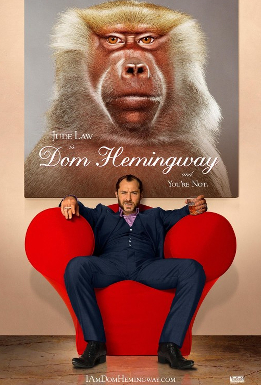There's an adage that's probably existed since the first writing professor: To break the rules, you have to know them inside and out first. One of the rules of thumb about screenwriting is that movies are a visual medium. Tales abound of screenplays being cut down to size"”an anecdote from the documentary Tales of the Script quotes Harrison Ford as telling a writer, "This is a great speech. But I'm not going to say it. I can say all this with a look."
Screenwriting guru Robert McKee is quick to remind aspiring writers in his classic textbook Story that in movies, stories are told through images rather than rich dialogue.
In the new Brit-gangster-comedy Dom Hemingway, writer-director Richard Shepard shows off his willingness to break the rules. Dom Hemingway's plot"”a manic British gangster is released from jail and looks to get rewarded for his loyalty"”is a vehicle for Shepard to have Jude Law (who plays Dom) deliver meaty line after meaty line.
Ultimately, it doesn't work. It's as if someone watched Snatch, decided to take out most of the characters, turn the story into a play, and then shoot the opening night performance on camera before releasing it as an AMC Fathom Event.
I'm not sure if this is because the dialogue just isn't as strong as everyone thought it was or as strong as perhaps it came off on the page. Dom Hemingway gives the opening monologue: an ode to his cock, all while he is receiving a blow-job from his prison "girlfriend." Maybe this is a highly intentional modernist subversive critique of the usual bourgeois heteronormative fare of the Brit-crime genre. But it comes off as immature and self-indulgent"¦and it doesn't get much better.
The proof is in the pudding. The best part of the movie isn't the overblown Dom Hemingway, but his morbid older brother-in-crime, the gaunt Richard E. Grant. He has no monologues, but his bizarre character is what stays with you after leaving the movie.
Another thing Dom Hemingway gets right is length: it is 93 minutes on the nose, a rare luxury in genre film these days. The ending was a nice button to the whole thing.
The movie has moments of good comedy and good acting, and not all of Shepard's dialogue is overwrought. As I said, maybe this sung on the page. But on camera, despite Jude Law obviously relishing the chance to break out of his romantic lead mold, Dom Hemingway comes across as breaking the rules without respecting why they were there in the first place.

